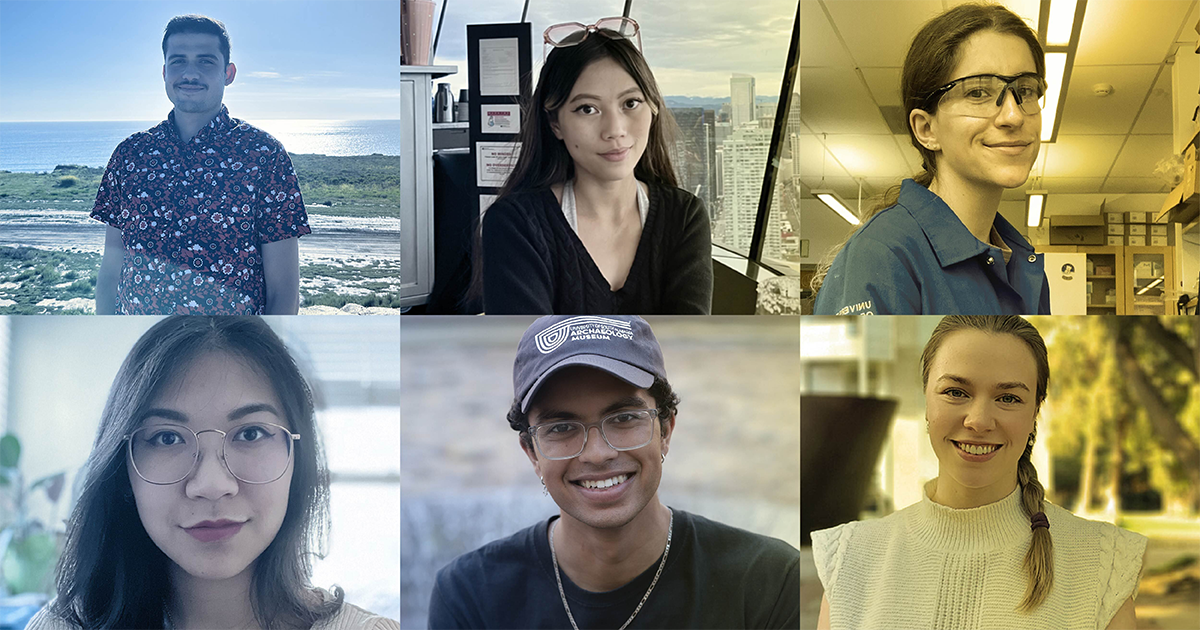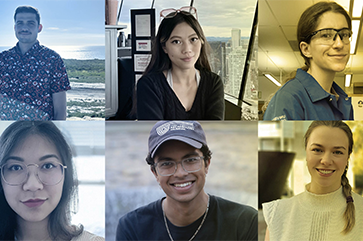Celebrating the UCLA College’s 2024 UCLA Grad Slam participants

Trever Ducote/UCLA (composite)
By Alvaro Castillo | March 27, 2024
Does the universe harbor life outside our planet? Can we engineer viruses to work for us — not against us? How can quantum computing help usher in the next era of technology? And, can AI help us understand how children acquire the skills to process, understand, and ultimately use language?
These are just a handful of the research topics UCLA College graduate students are exploring, and at this year’s UCLA Grad Slam, they’ve had the opportunity to showcase their unique interests.
(Read more about the competition and watch a livestream of the final round on April 2.)
Congratulations to all the incredible College competitors in this year’s Grad Slam, and learn more about some of them below.
Sahil Hegde
Astronomy & Astrophysics
Finding the First Stars
What do you love most about the subject you’re researching? Astronomy was always the stuff of science fiction books for me growing up. It wasn’t until I got to college, took astronomy classes and did some research that I realized that people could study the universe for a living! I love to see how creative astronomers can be when extracting information from our observations of everything in the sky. It never ceases to amaze me that we can construct models based on what we’ve learned about physics here on Earth that describe what objects millions of miles away look like.
What are your plans for after completing your doctorate? I hope to stay in academia and continue my research as a postdoctoral fellow and ultimately as a professor.
What would you say to readers interested in learning more about physics or astronomy? People are always intimidated when I tell them that I study physics or astronomy, but I don’t think that they should be! Everybody has their niche — but I firmly believe that anyone can be successful in astronomy or physics if they put their mind to it!
Ekaterina (Katya) Khlystova
Linguistics
Learning to Understand Sentences
What do you love most about the subject you’re researching? I think there’s something universal about looking at how kids learn language. Kids start out as babies that can’t understand anything. Then this tiny, little being grows into an adult who ends up being able to do, say, quantum physics because they’ve gone to school and taken classes. Obviously, there’s a different type of reasoning that happens when you’re at high levels of research, but all of that is based on being able to understand language.
My research also involves actually working with kids, which is super fun. It can be a little frustrating sometimes because they love to throw curveballs at you… There’s a lot of mental flexibility that has to happen with trying to keep an experiment controlled but still making it fun and engaging for kids.
What are your plans for after completing your doctorate? When I graduate, I’m actually thinking of going outside of academia and into the private sector, because I’ve realized that I really like fast-paced projects and work. I’m not completely sure — I’m very open to a lot of different possibilities, but I want to do something research-based. That way, I can still use the experimental aspects of what I’ve learned so far as a doctoral student.
How would you sum up preparing for and participating in Grad Slam? The whole Grad Slam experience reminded me how fun and how interesting research is. Preparing for Grad Slam helped me remember why this research matters to me and helped me explain to other people what they can take away from it, too. It was a really fun way to remind me why I started doing this PhD anyway.
Megan Li
Astronomy & Astrophysics
Are We Alone in the Universe?
What do you love most about the subject you’re researching? The search for extraterrestrial intelligence reminds me how special it is to be human. I was always an awkward little kid, especially having grown up with disabilities and it took me a long time to build a community. Once I learned how to build one, I never wanted to stop. For me, UCLA SETI is the cornerstone of astrophysics and community building (both terrestrially or otherwise). I simply could not dream of a better field.
What are your plans for after completing your doctorate? I would love to continue working with SETI in both research and science communication. I think that SETI is a great opportunity for the academic community to get the general public excited about science, and I want to contribute to the efforts of improving scientific literacy by talking to everyone about the possible existence of aliens.
Is there anything readers can do to help you in your quest to find extraterrestrial life? I hope all of our readers check out arewealone.earth where you can directly contribute to my research by identifying possible signals from ET.
Stefano Roccasecca
Physics
Why Do We Need Fast Computers?
What do you love most about the subject you’re researching? Its relevance to today’s computer technology. And with the hype surrounding AI, work like mine gets highlighted for its underpinning importance. Quantum computing is a cutting-edge technology and the experimental techniques I use overlap a lot with high-frequency semiconductor fabrication, which is a growing industry.
What are your plans for after completing your doctorate? After graduation I hope to work for a company in the chip manufacturing industry where I can one day call myself the “science boss.”
Why would you encourage readers to learn more about quantum computing or technology in general? I believe that for the broader public, a better understanding of how technology works can help
make better societal decisions.
Shelby Vexler
Chemistry
From Foe to Friend: Viruses that Fight Bacteria
What do you love most about the subject you’re researching? My research revolves around phages, which are viruses that infect bacteria. I first learned about phages and the concept of using them as an alternative treatment for antibiotic resistant infections in high school. I was instantly intrigued, as I had just lost a good chunk of my summer vacation to a case of walking pneumonia that required two different antibiotics to treat. For me, it’s very gratifying to work directly on the subject that sparked my pursuit of a scientific research career.
What are your plans for after completing your doctorate? I’d like to continue my academic career as a postdoctoral researcher.
Helena Winata
Bioinformatics
Darwinian Evolution in Cancer
What do you love most about the subject you’re researching? I’m fascinated by complex systems and problems, particularly in the biological and computational field. I love that my research because it allows me to combine my two passions! Data and algorithms are powerful tools for solving complex biological problems and I want to use them to improve patient care and overall well-being.
What are your plans for after completing your doctorate? Beyond my Ph.D., I want to keep contributing to the field of personalized medicine and work towards finding a long term solution to cancer.




